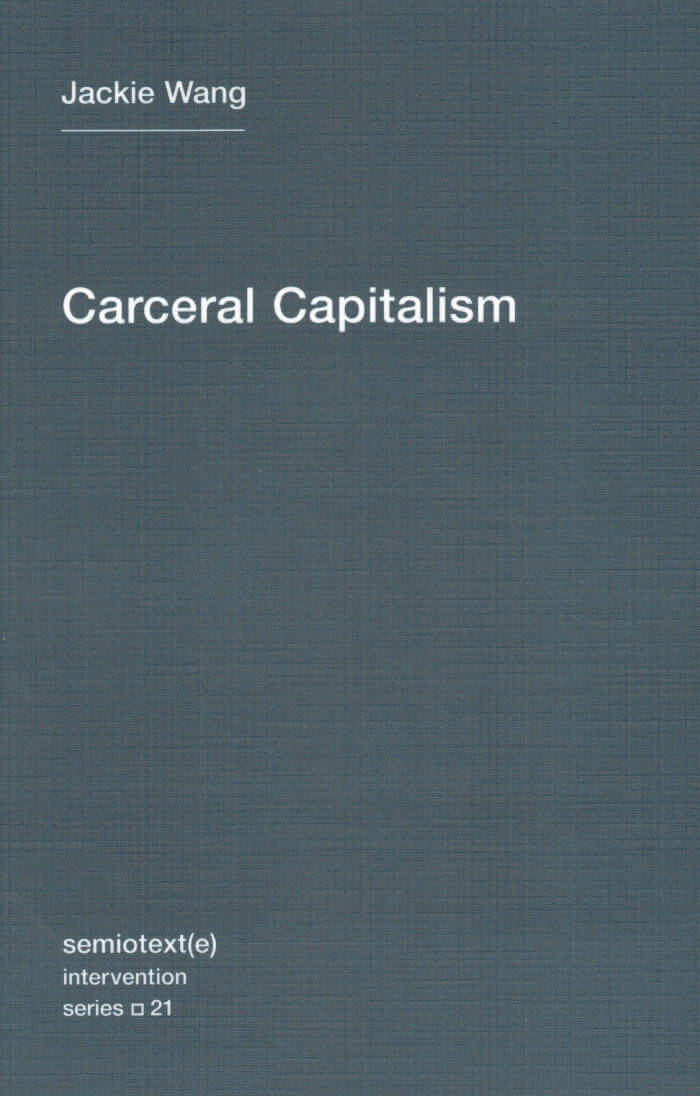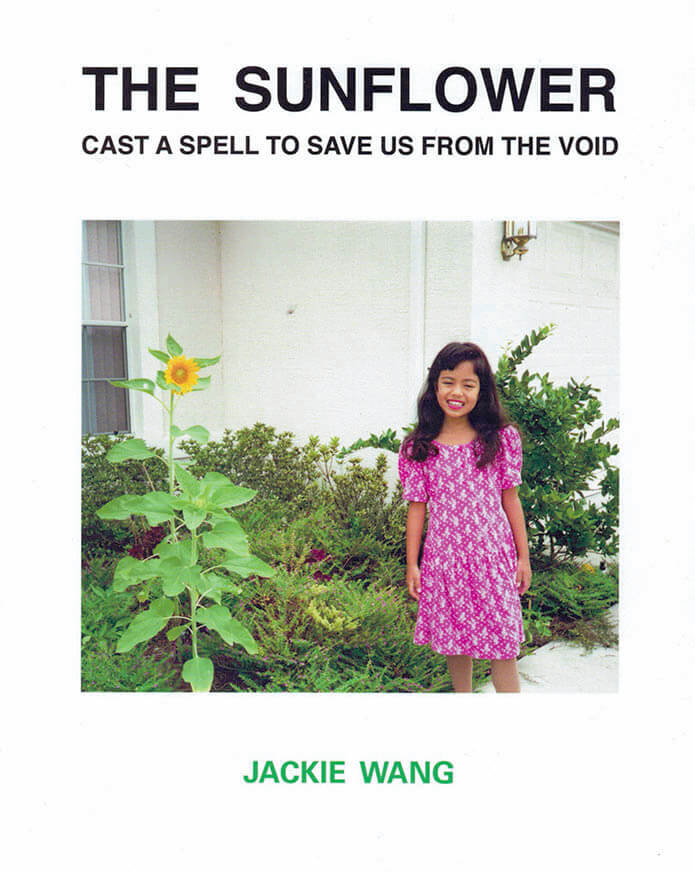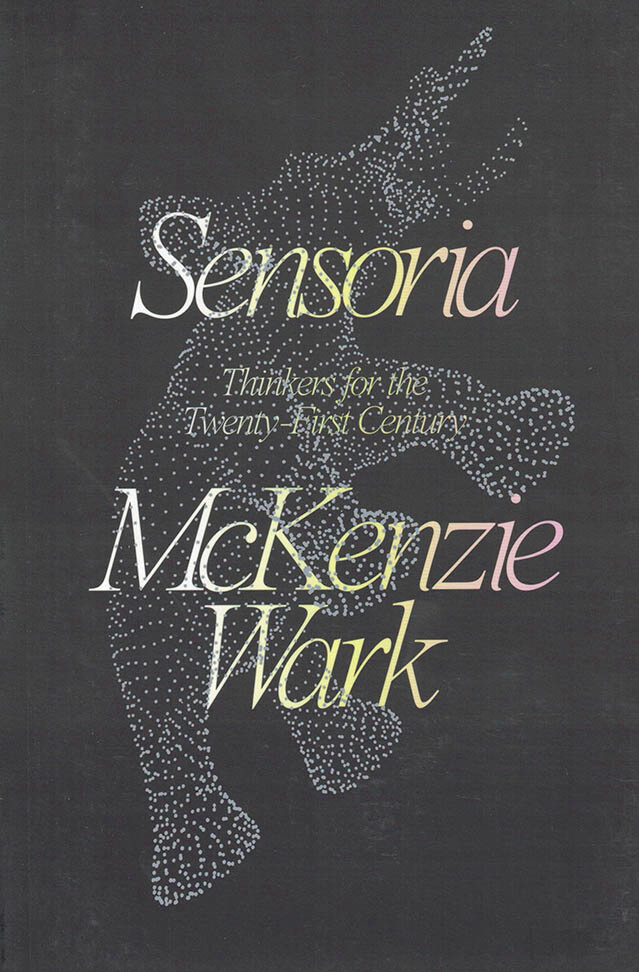Jackie Wang
Jackie Wang

Alien Daughters Walk Into the Sun: An Almanac of Extreme Girlhood
The early writings of renowned poet and critical theorist Jackie Wang, drawn from her early zines, indie-lit crit, and prolific early 2000s blog.
Compiled as a field guide, travelogue, essay collection, and weather report, Alien Daughters Walk into the Sun traces Jackie Wang's trajectory from hard femme to Harvard, from dumpster dives and highway bike rides to dropping out of an MFA program, becoming a National Book Award finalist, and writing her trenchant book Carceral Capitalism. Alien Daughters charts the dream-seeking misadventures of an "odd girl" from Florida who emerged from punk houses and early Tumblr to become the powerful writer she is today. Anarchic and beautifully personal, Alien Daughters is a strange intellectual autobiography that demonstrates Wang's singular self-education: an early life lived where every day and every written word began like the Tarot's Fool, with a leap of faith.

Carceral Capitalism
Essays on the contemporary continuum of incarceration: the biopolitics of juvenile delinquency, predatory policing, the political economy of fees and fines, and algorithmic policing.
What we see happening in Ferguson and other cities around the country is not the creation of livable spaces, but the creation of living hells. When people are trapped in a cycle of debt it also can affect their subjectivity and how they temporally inhabit the world by making it difficult for them to imagine and plan for the future. What psychic toll does this have on residents? How does it feel to be routinely dehumanized and exploited by the police?
In this collection of essays in Semiotext(e)'s Intervention series, Jackie Wang examines the contemporary incarceration techniques that have emerged since the 1990s. The essays illustrate various aspects of the carceral continuum, including the biopolitics of juvenile delinquency, predatory policing, the political economy of fees and fines, cybernetic governance, and algorithmic policing. Included in this volume is Wang's influential critique of liberal anti-racist politics, "Against Innocence," as well as essays on RoboCop, techno-policing, and the aesthetic problem of making invisible forms of power legible.
Wang shows that the new racial capitalism begins with parasitic governance and predatory lending that extends credit only to dispossess later. Predatory lending has a decidedly spatial character and exists in many forms, including subprime mortgage loans, student loans for sham for-profit colleges, car loans, rent-to-own scams, payday loans, and bail bond loans. Parasitic governance, Wang argues, operates through five primary techniques: financial states of exception, automation, extraction and looting, confinement, and gratuitous violence. While these techniques of governance often involve physical confinement and the state-sanctioned execution of black Americans, new carceral modes have blurred the distinction between the inside and outside of prison. As technologies of control are perfected, carcerality tends to bleed into society.

Say Bye to Reason and Hi to Everything
Dodie Bellamy, Lynne Tillman and 3 more
Say Bye to Reason and Hi to Everything is a collection of chapbooks by Dodie Bellamy, Cecilia Corrigan (with illustrations by Jocelyn Spaar), Amy De’Ath, Lynne Tillman, and Jackie Wang. Each chapbook is uniquely designed with an accompanying cover by artist Nayland Blake and features new or previously uncollected works by each writer. The collection is edited by Andrew Durbin.
This box set features the following titles:
Dodie Bellamy, More Important than the Object. Cecilia Corrigan, Cream. Amy De’Ath, ON MY LOVE FOR gender abolition. Lynne Tillman, In These Intemperate Times: 9 Frieze Columns. Jackie Wang, Tiny Spelunker of the Oneiro-Womb
Dodie Bellamy is an American novelist, nonfiction author, journalist and editor who writes genre-bending works that focus on sexuality, politics, and narrative experimentation, challenging the distinctions between fiction, essay, and poetry. Her methods include radical feminist revisions of canonical works. Bellamy is one of the originators in the New Narrative literary movement of the early and mid 1980s, which attempts to use the tools of experimental fiction and critical theory and apply them to narrative storytelling. Bellamy also directed the San Francisco writing lab, Small Press Traffic. She teaches creative writing at San Francisco State University and California College of the Arts.
Cecilia Corrigan is a writer and performer. She recently starred in the short film Crush, which she co-wrote with director Katherine Bernard, now streaming at Dazed Magazine. She was recently selected as one of Issue Project Room’s Artists in Residence for 2016-17. Her first full-length book, Titanic, won the Plonsker Prize and the chapbook True Beige, (Trafficker Press). She is completing her PhD in Comparative Literature at NYU, writing about social media, makeup, and comedy. Her fiction and essays have been published many places including n+1, Joyland, and Nerve.
Amy De’Ath’s poetry chapbooks include Lower Parallel (Barque 2014), Caribou (Bad Press 2011), and Erec & Enide (Salt 2010). With Fred Wah, she is the editor of a poetics anthology, Toward. Some. Air. (Banff Centre Press 2015). Her criticism has appeared in Women: A Cultural Review, Anguish Language (Archive Books 2015), and Cambridge Literary Review, and is forthcoming in After Objectvism: Reconfiguring 21st-Century Poetry and Poetics (U of Iowa P 2017). She is a PhD Candidate at Simon Fraser University and lives in Vancouver, on unceded Coast Salish Territories.
Lynne Tillman is a novelist, short story writer and critic. Her most recent collection of essaysWhat Would Lynne Tillman Do? was a finalist for the National Book Critics Circle Award in Criticism (2014). Her most recent novel is American Genius, A Comedy (2006), on The Millions’ list of Best Novels So Far in the Millennium. Tillman writes frequently for artists books and catalogues, and has a bimonthly column in Frieze art magazine. In fall 2016, Semiotext(e) will publish hernew collection of fiction, The Complete Madame Realism and Other Stories. She is currently finishing a novel, Men and Apparitions, due to be pubbed in 2017.
Jackie Wang is a writer, poet, musician, and author of Against Innocence (Semiotext(e)), as well as the zines On Being Hard Femme, Memoirs of a Queer Hapa, The Adventures of Loneberry, and The Phallic Titty Manifesto. In her critical essays she writes about queer sexuality, race, gender, the politics of writing, mixed-race identity, prisons and police, the politics of safety and innocence, and revolutionary struggles. Her blog, Ballerinas Dance with Machine Guns, reads like a journal that explores writing as process, the personal as political.

The Sunflower
Jackie Wang's magnetic and spellbinding debut collection of poetry that attempts to speak in the language of dreams.
The poems in The Sunflower Cast A Spell To Save Us From The Void read like dispatches from the dream world, with Jackie Wang acting as our trusted comrade reporting across time and space. By sharing her personal index of dreams with its scenes of solidarity and resilience, interpersonal conflict and outlaw jouissance, Wang embodies historical trauma and communal memory. Here, the all-too-familiar interplay between crisis and resistance becomes first distorted, then clarified and refreshed. With a light touch and invigorating sense of humor, Wang illustrates the social dimension of dreams and their ability to inform and reshape the dreamer's waking world with renewed energy and insight.
Jackie Wang is a student of the dream state, black studies scholar, prison abolitionist, poet, performer, library rat, trauma monster and PhD candidate in the Department of African and African American Studies at Harvard University, specializing in race and the political economy of prisons and police in the United States. She is the author of a number of punk zines including On Being Hard Femme, as well as a collection of dream poems titled Tiny Spelunker of the Oneiro-Womb. In 2018 she published a book, titled Carceral Capitalism on the racial, economic, political, legal, and technological dimensions of the US carceral state. She is currently an Arleen Carlson and Edna Nelson Graduate Fellow at the Radcliffe Institute for Advanced Study.
And more

Ethical Portraits: In Search Of Representational Justice
Ethical Portraits investigates the representation of the incarcerated in the U.S. criminal justice system. Through interviews, creative non-fiction, and cultural theory, Hatty Nestor deconstructs a range of different prison portraiture.
Prisons systematically dehumanise the imprisoned. Visualised through mugshots and surveillance recordings, the incarcerated lose control of their own image and identity. The criminal justice system in the United States does not only carry out so-called justice in ways that compound inequality, it also minimises the possibility for empathetic encounters with those who are most marginalised. It is therefore urgent to understand how prisoners are portrayed by the carceral state and how this might be countered or recuperated. How can understanding the visual representation of prisoners help us confront the invisible forms of power in the American prison system? Ethical Portraits investigates the representation of the incarcerated in the United States criminal justice system, and the state's failure to represent those incarcerated humanely.
Through wide-ranging interviews and creative nonfiction, Hatty Nestor deconstructs the different roles of prison portraiture, such as in courtroom sketches, DNA profiling, and the incarceration of Chelsea Manning. Includes a foreword by Jackie Wang.
Hatty Nestor is a cultural critic and writer, published in Frieze, The Times Literary Supplement, The White Review and many other publications. She is currently completing a PhD at Birkbeck, University of London.

Sensoria
As we face the compounded crises of late capitalism, environmental catastrophe and technological transformation, who are the thinkers and the ideas who will allow us to understand the world we live in? McKenzie Wark surveys three areas at the cutting edge of current critical thinking: design, environment, technology and introduces us to the thinking of nineteen major writers. Each chapter is a concise account of an individual thinker, providing useful context and connections to the work of the others.
The authors include: Sianne Ngai, Kodwo Eshun, Lisa Nakamura, Hito Steyerl, Yves Citton, Randy Martin, Jackie Wang, Anna Lowenhaupt Tsing, Achille Mbembe, Deborah Danowich and Eduardo Viveiros de Castro, Eyal Weizman, Cory Doctorow, Benjamin Bratton, Tiziana Terranova, Keller Easterling, Jussi Parikka.
Wark argues that we are too often told that expertise is obtained by specialisation. Sensoria connects the themes and arguments across intellectual silos. They explore the edges of disciplines to show how we might know the world: through the study of culture, the different notions of how we create such things, and the impact that the machines that we devise have had upon us. The book is a vital and timely introduction to the future both as a warning but also as a road map on how we might find our way out of the current crisis.
McKenzie Wark is the author of Capital is Dead, General Intellects and Molecular Red among other books. She teaches at the New School for Social Research and Eugene Lang College in New York City.